Overview of the Recent Recall Announcements
GM recalls engine failure has become a significant concern for millions of vehicle owners across the United States. General Motors, one of America’s largest automakers, has issued multiple recalls in recent years due to various engine-related problems that pose serious safety risks to drivers and passengers.
Engine failures can lead to sudden power loss, stalling, and even complete vehicle breakdown while driving, creating dangerous situations on busy roads and highways. When GM recalls engine failure occurs, it affects not only vehicle safety but also owner confidence and financial well-being.
Understanding these recalls is crucial for GM vehicle owners who want to protect themselves and their families. This comprehensive guide covers everything you need to know about GM engine failure recalls, including affected models, common symptoms, repair procedures, and your rights as a consumer. Whether you own a Chevrolet, Buick, GMC, or Cadillac vehicle, staying informed about GM recalls engine failure can help you take prompt action and ensure your safety on the road.
NHTSA Involvement and Official Statements
The National Highway Traffic Safety Administration (NHTSA) has worked closely with GM to investigate and verify the extent of the defect. After analyzing hundreds of consumer complaints and technical data, the NHTSA supported the decision to recall vehicles with faulty 6.2L GM engines.
In a statement, the agency noted:
The engine failure in affected GM vehicles poses a significant safety risk due to the potential for sudden power loss at high speeds or while maneuvering. GM is cooperating to address the defect through recall campaigns and software updates.
List of GM Vehicles Affected by Engine Recalls
GM recalls engine failure across a wide range of models, particularly those equipped with the 6.2L V8 engine (L87, LT1, LT4). The GM SUV Truck l87 recall covers popular models such as the Silverado 1500, GMC Sierra, Chevy Tahoe, Suburban, and Cadillac Escalade, many of which have reported valve spring failures, lifter collapses, and stalling during normal operation.
Affected GM Vehicles Table
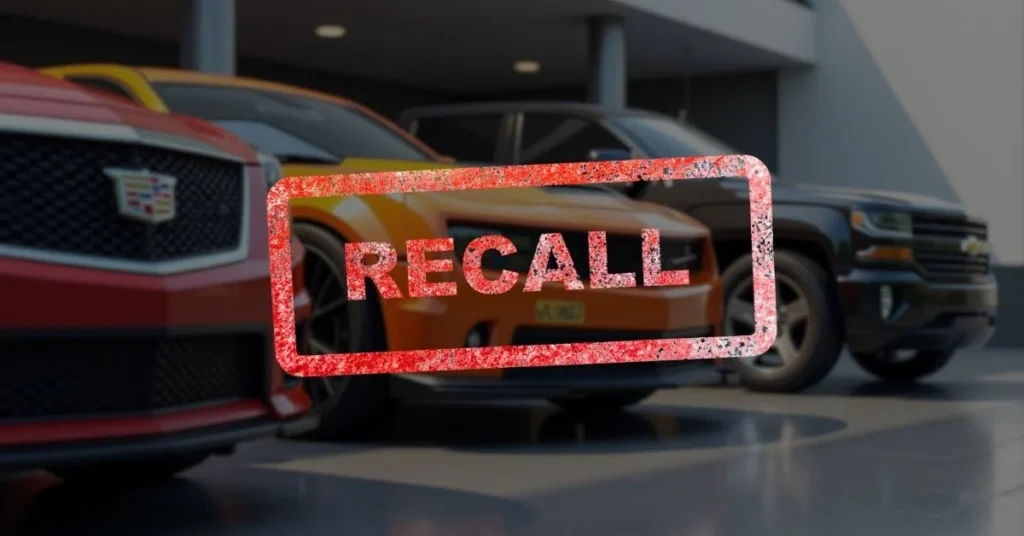
| Make & Model | Engine Type | Model Years | Known Issue | Recall Status |
| Cadillac Escalade | 6.2L L87 V8 | 2021–2023 | Valve spring failure | Recalled |
| Chevrolet Silverado 1500 | 6.2L L87 V8 | 2019–2023 | Engine misfire & stalling | Recalled |
| GMC Sierra 1500 | 6.2L L87 V8 | 2019–2022 | Lifters collapsing | Recalled |
| Camaro SS | 6.2L LT1 V8 | 2020–2023 | Sudden loss of power | Recalled |
| Cadillac CT5-V Blackwing | 6.2L LT4 Supercharged | 2022–2024 | Engine overheating | Under Investigation |
| Chevrolet Suburban | 6.2L L87 V8 | 2021–2023 | Stalling under load | Recalled |
| GMC Yukon Denali | 6.2L L87 V8 | 2021–2023 | Engine knock, warning lights | Recalled |
| Chevy Tahoe | 6.2L L87 V8 | 2021–2023 | Cylinder deactivation failure | Recalled |
| Camaro ZL1 | 6.2L LT4 V8 | 2020–2022 | Powertrain malfunction | Under Review |
GM Transmission Recall Breakdown
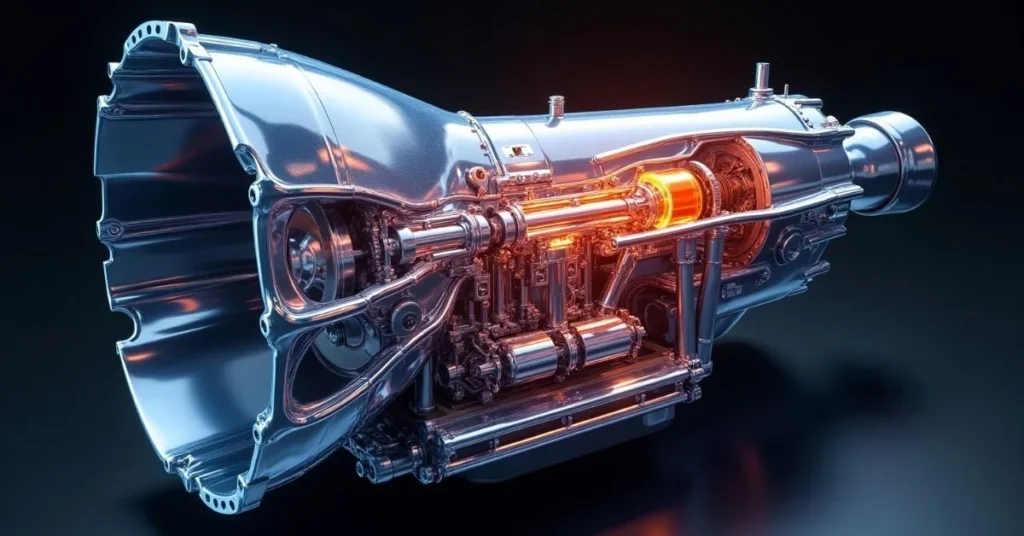
Cadillac & Camaro Transmission Failures
GM engine failures are not the only concern—transmission-related issues have also plagued certain Cadillac and Camaro models. Specifically, models equipped with automatic transmissions have shown recurring symptoms like gear slipping, hesitation during acceleration, delayed shifting, and in some cases, harsh or abrupt gear engagement.
Common Issues Reported with Camaro & Cadillac Automatic Transmissions
The primary issue stems from excessive wear in the transmission control valve, which can cause a fluid leak and a subsequent loss of pressure within the transmission. This defect has been linked to the following symptoms:
- Slipping: Drivers may experience the transmission slipping, where the vehicle struggles to maintain power or shifts unexpectedly, leading to a loss of acceleration or control.
- Hesitation: There are reports of delayed engagement when shifting from Park to Drive or Reverse, or hesitation during acceleration, which can be particularly dangerous in traffic or when merging.
- Harsh Shifts: Owners have noted rough or jarring gear changes, often described as feeling like driving over “rumble strips,” especially during upshifts or downshifts.
Affected GM Transmissions
If your GM transmission isn’t shifting properly or your vehicle isn’t covered under the recall, you can shop high-quality used GM transmissions from us :
| Transmission | Models Used | Problem |
| 4L70E Transmission | Silverado, Tahoe, Yukon | Shift failure |
| 700R4 Transmission | Older GM models | Delayed engagement |
| GM 10R80 Transmission | Camaro, F-150 (Ford-GM) | Sudden gear drops |
| GM 6L80 Transmission | SUVs & trucks | Overheating |
| GM 4L80E Transmission | Heavy-duty trucks | Fluid leakage |
| GM NV4500 Transmission | Pickup trucks | Synchronizer failure |
| GM 4L60E Transmission | SUVs, Sedans | Shift solenoid issues |
| GM 4T65E Transmission | FWD vehicles | Valve body malfunction |
| GM 8L90 Transmission | Corvette, Escalade | Harsh shifting |
| GM NV3500 Transmission | Light-duty trucks | Grinding in gears |
What Causes GM Engine Failure?
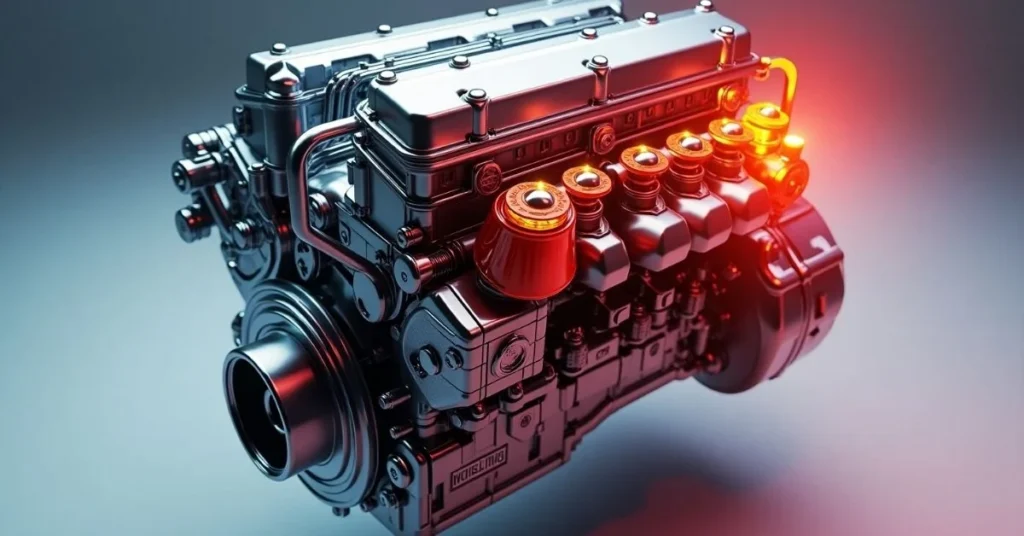
Affected Vehicle Models and Years
Chevrolet Models
GM recalls engine failure have significantly impacted Chevrolet vehicles:
- Silverado 1500 (2019-2021): Fuel pump and oil pump issues
- Malibu (2017-2020): Timing chain and oil consumption problems
- Equinox (2018-2022): Multiple engine-related defects
- Tahoe (2020-2021): Engine block and fuel system issues
- Camaro (2019-2021): Oil pump and timing chain problems
GMC Models
GMC vehicles affected by engine failure recalls include:
- Sierra 1500 (2019-2021): Similar issues to Silverado
- Terrain (2018-2022): Engine timing and oil system problems
- Yukon (2020-2021): Fuel pump and engine block issues
- Canyon (2019-2021): Oil consumption and timing problems
Cadillac and Buick Models
Luxury brands haven’t escaped GM recalls engine failure:
- Cadillac XT4 and XT5: Engine block cracks and oil leaks
- Cadillac Escalade: Fuel system and timing chain issues
- Buick Encore GX: Oil pump and engine timing problems
- Buick Enclave: Various engine-related defects
Warning Signs of Engine Problems
Early Warning Symptoms
Recognizing these signs can help you identify potential engine problems before complete failure:
- Check engine light illumination
- Unusual engine noises like knocking or rattling
- Loss of power during acceleration
- Rough idling or engine hesitation
- Excessive oil consumption requiring frequent top-offs
- White or blue exhaust smoke
Emergency Warning Signs
These symptoms require immediate attention:
- Sudden engine shutdown while driving
- Complete loss of power on highways
- Engine overheating warnings
- Oil pressure warning lights
- Unusual burning smells from the engine bay
- Metal particles in engine oil
What to Do If Your Vehicle Is Recalled
Immediate Steps
When you learn about a GM recalls engine failure affecting your vehicle:
- Stop driving immediately if experiencing symptoms
- Contact your local GM dealer to schedule inspection
- Check recall status using your VIN number online
- Document all symptoms and repair history
- Keep all maintenance records for warranty claims
Repair Process
The typical recall repair process includes:
- Free inspection by authorized GM technicians
- Diagnosis confirmation of the specific problem
- Parts replacement at no cost to owner
- Complete testing to ensure proper repair
- Extended warranty coverage for related issues
Your Rights as a Consumer
GM recalls engine failure situations give you specific rights:
- Free repairs for all recalled components
- Rental car coverage during extended repairs
- Compensation for previous repair costs
- Lemon law protection for repeated failures
- Legal recourse for damages or injuries
Prevention and Maintenance Tips
Regular Maintenance Practices
To minimize the risk of engine problems:
- Follow manufacturer maintenance schedules strictly
- Use only recommended oil types and change regularly
- Monitor fluid levels including oil, coolant, and fuel
- Address warning lights immediately
- Keep detailed maintenance records
Monitoring Your Vehicle
Stay alert for signs of potential problems:
- Listen for unusual noises during operation
- Watch for performance changes in acceleration or idle
- Monitor dashboard warning lights carefully
- Check for leaks under parked vehicle
- Note any changes in fuel economy
Financial Impact and Compensation
Repair Costs
GM recalls engine failure can involve expensive repairs:
- Engine replacement: $8,000 – $15,000
- Timing chain repair: $2,000 – $4,000
- Fuel pump replacement: $800 – $1,500
- Oil pump repair: $1,200 – $2,500
Available Compensation
GM may provide various forms of compensation:
- Reimbursement for previous repair costs
- Extended warranties beyond standard coverage
- Goodwill payments for inconvenience
- Trade-in assistance for severely affected vehicles
Legal Considerations and Class Action Lawsuits
Current Legal Actions
Several class action lawsuits are underway regarding GM recalls engine failure:
- Engine defect lawsuits seeking damages for repairs
- Safety violation claims for inadequate recalls
- Economic loss cases for diminished vehicle value
- Personal injury suits for accidents caused by failures
When to Consult an Attorney
Consider legal consultation if you experience:
- Repeated engine failures after recall repairs
- Accidents or injuries caused by engine problems
- Significant financial losses from repairs or replacements
- GM’s refusal to provide adequate compensation
What Customers Should Do Next
- Check VIN: Check your VIN using our Free VIN Decoder Tool or the NHTSA Recall Lookup.
- Schedule Inspection: Contact dealers (Cadillac: 1-800-333-4223, Chevrolet: 1-800-222-1020, GMC: 1-800-462-8782) to schedule a free inspection, referencing recall N252494000.
- Monitor Symptoms: Watch for warning signs like knocking noises, check engine lights, or reduced power, and report issues to dealers.
- Keep Records: Document maintenance and repairs for potential reimbursement or legal claims.
- Stay Informed: Notification letters were expected by June 9, 2025. If you haven’t received one, visit NHTSA.gov or call 1-888-327-4236 for the latest recall updates.
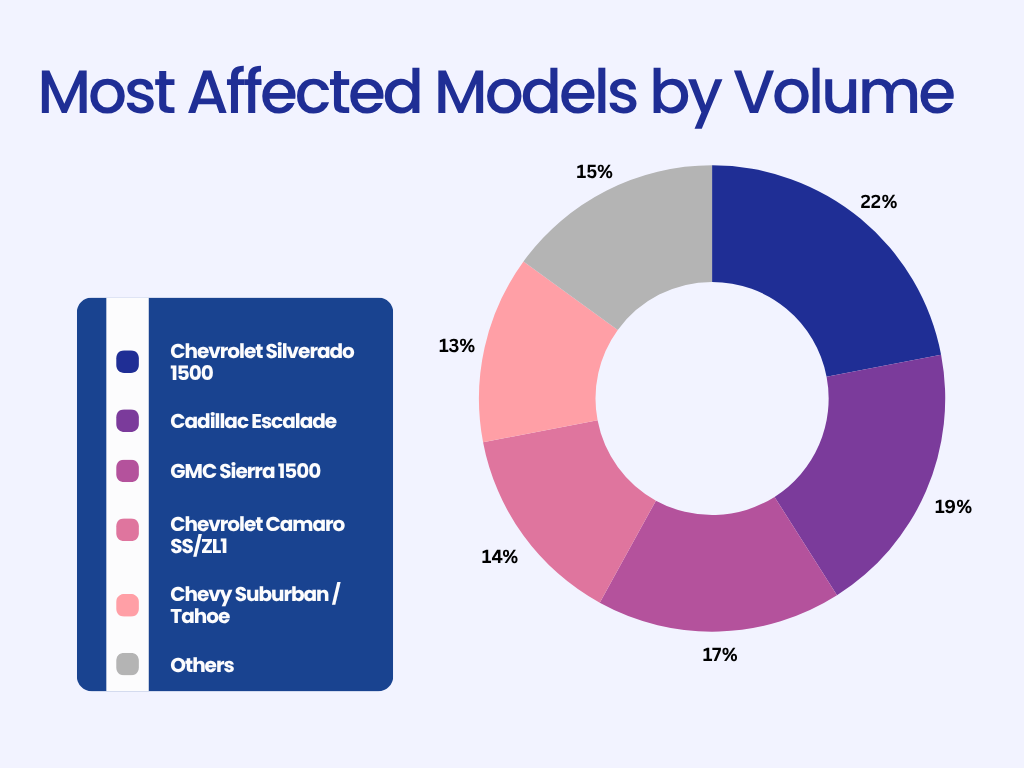
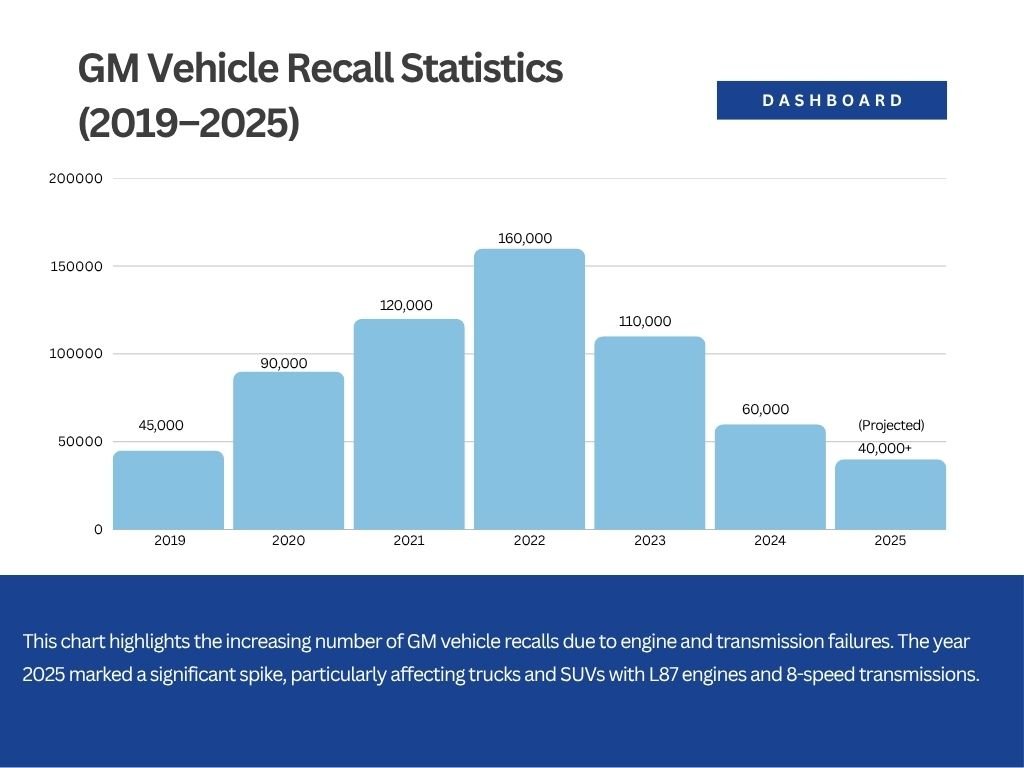
Conclusion
The recent surge in GM recalls engine failure highlights the critical importance of proactive vehicle maintenance and prompt attention to recall notices. With thousands of GM vehicles—including those with 6.2L engines, SUVs, and trucks—facing potential engine and transmission issues, owners must stay informed and take immediate action.
-
What is the main reason behind the GM recalls engine failure?
The primary cause is a combination of valve spring defects, faulty ECM programming, and timing chain issues—especially in vehicles with 6.2L GM engines and L87 V8 trucks.
-
Which GM vehicles are affected by the 6.2L engine recall?
The recall primarily includes Cadillac, Chevrolet SUVs, and trucks equipped with the L87 6.2L engine, spanning models from 2020–2024. Use our VIN checker to confirm if your vehicle is on the list.
-
Does the recall also impact GM transmissions?
Yes. Some models, like the Camaro and Cadillac, have been part of the GM Cadillac Camaro transmission recall, with issues including slipping and delayed shifting. If you need a replacement, explore our options like GM 4L60E transmission or GM 10R80 transmission.
-
What should I do if my GM vehicle is part of the recall?
Contact your local dealership immediately. GM is offering free inspections, repairs, or replacements depending on the fault. You can also use our VIN Decoder Tool to check your vehicle’s status.
-
My engine isn’t covered under the GM recall—what now?
If you’re experiencing engine or transmission problems but aren’t eligible for a recall fix, consider replacing it with a quality used GM engine or transmission. Browse our inventory of GM 5.3 LS engines, GM 4L80E transmissions, and GM NV3500 transmissions for a reliable solution.

